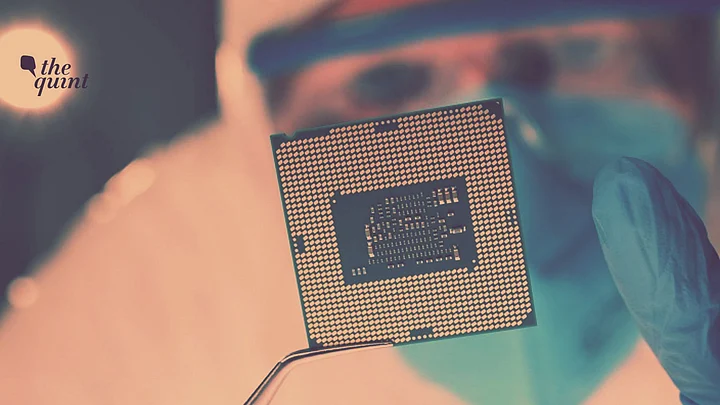Taiwan's electronics giant Foxconn, which manufactures iPhones in Tamil Nadu, has partnered with mining conglomerate Vedanta to make semiconductors in India amid a global chip shortage.
This is the first such announcement after the government rolled out an incentive scheme worth Rs 76,000 crore (roughly $10 billion) to attract international semiconductor and display manufacturers.
Foxconn said it would invest $118.7 million (around Rs 900 crore) to set up a company that would manufacture semiconductors in India. Discussions are currently ongoing with a few state governments to finalise the location of the plant.
"This first-of-its-kind joint venture between the two companies will support Indian Prime Minister Narendra Modi's vision to create an ecosystem for semiconductor manufacturing in India," a statement released by Foxconn said.
The project could potentially lead to the construction of India's first semiconductor fabrication plant (FAB). It will provide a significant boost to domestic manufacturing of electronics in India, the statement said.
However, it is worth noting that this agreement is based on a memorandum of understanding (MoU) which doesn't commit either party to anything. The companies will need to release more details for this venture to be considered concrete.
Foxconn and Vedanta
Foxconn, also known as Hon Hai Precision Industry, is one of the biggest electronics manufacturers in the world. It makes products for Apple, Microsoft, Sony, Nintendo, and other big-name brands.
Vedanta Group is a global conglomerate with presence in metals, mining, oil and gas, power, telecom, and glass. In 2017, it had acquired AvanStrate, a Japanese LCD panel glassmaker. It was also set to acquire debt ridden electronics brand Videocon, but ran into regulatory hurdles.
Vedanta will hold the majority of the equity in the new venture, while Foxconn will be the minority shareholder with 40 percent shares. Vedanta chairman Anil Agarwal will also be the chairman of the joint venture company.
In recent years, semiconductor manufacturing has become one of Foxconn's core businesses. Last year, it signed a pact with components manufacturer Yageo Corp to expand its production. It has also ventured into the electric vehicle business.
Its iPhone manufacturing facility near Chennai, Tamil Nadu, was briefly shut after workers protested a mass-food poisoning incident at the offsite dormitory facility, but has since reopened.
India Doesn't Manufacture Semiconductors Yet
A semiconductor chip is an electric circuit with many components like transistors and wiring formed on a semiconductor wafer. They act as tiny brains for most modern electronics.
According to government data, India imports a 100 percent of its semiconductors. This is because manufacturing them is a difficult job.
Fabrication plants (FABs) are expensive to set up (each costs at least $3-4 billion) and manufacturing equipment depreciates fairly quickly. They also take a long time to become profitable.
Apart from the high costs involved in setting up a plant, there are also certain infrastructure requirements that are vital; mainly, an uninterrupted power supply and access to millions of litres of pure water.
India is lacking in these departments: we experience frequent power cuts and our water supply treatment isn't up to the mark. Before the global chip shortage, these factors were enough to discourage foreign players from setting up shop in India.
India is, however, a strong base for semiconductor chip design, which is a more software-heavy process. According to the Ministry of Electronics and Information Technology, there is also a growing talent pool of engineers in India that are skilled in integrated chip (IC) design.
India's New Incentive Scheme
India has approved a production-linked incentive (PLI) scheme worth Rs 76,000 crore (roughly $10 billion) to attract global chipmakers to set up FABs in the country. The government has said that it expects the scheme to create more than 1 lakh jobs and attract investment worth Rs 1,67,000 crore.
Under this scheme, the government will extend fiscal support of up to 50 percent of a project's cost to eligible display and semiconductor makers, offsetting the high costs of setting up a plant.
Under previous schemes, like in 2017, the government offered incentives on incremental sales, which wouldn't have cut the high initial investment for manufacturers.
Over 20 semiconductor manufacturing and designing companies have reportedly submitted Expressions of Interest (EOIs) to set up manufacturing plants in India, Business Line reported.
(With inputs from Business Line.)
(At The Quint, we question everything. Play an active role in shaping our journalism by becoming a member today.)
